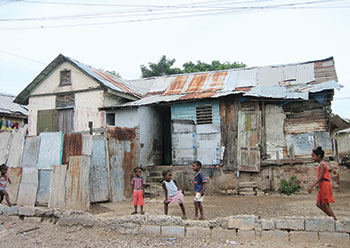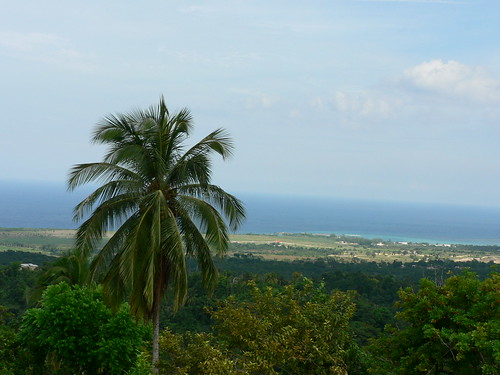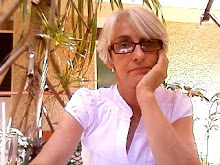The 5th Caribbean Conference continues to dominate my work and final changes were completed this week. The numbers are somewhat smaller than had been hoped for but with some re-organising the conference should not only provide many stimulating presentations and discussions but should also break even financially. With presenters and participants from South Africa, Trinidad, Barbados, Haiti, Guyana, St Lucia, North America and Jamaica the scope and international applications of ADR should well illustrated.
 Linga", that DRF has been involved with funded by Jamaica Social Investment Fund and the Japanese funding to reduce violence(JSIF/JAVA). The project has focused on "unattached youth" or "corner youth", terms applied to young men who are not in school or do not have legitimate employment and gather on the "corners" in the poorest communities. They can project a somewhat menacing aura and are frequently connected to loosely formed gangs with access to guns. In Rose Town the police recently put a curfew in place as the violence and gang activity had flared.
Linga", that DRF has been involved with funded by Jamaica Social Investment Fund and the Japanese funding to reduce violence(JSIF/JAVA). The project has focused on "unattached youth" or "corner youth", terms applied to young men who are not in school or do not have legitimate employment and gather on the "corners" in the poorest communities. They can project a somewhat menacing aura and are frequently connected to loosely formed gangs with access to guns. In Rose Town the police recently put a curfew in place as the violence and gang activity had flared.  This is one of the communities from which the youth are scheduled to attend so, added to the challenge of organising score of youth unaccustomed to being organised is the difficulty of getting them through the curfew barriers. This will be no mean task as the police will see many of the youth as those that they associate with the threat. In addition a significant cache of arms was recently discovered in the community and the consequence of this is yet uncertain.
This is one of the communities from which the youth are scheduled to attend so, added to the challenge of organising score of youth unaccustomed to being organised is the difficulty of getting them through the curfew barriers. This will be no mean task as the police will see many of the youth as those that they associate with the threat. In addition a significant cache of arms was recently discovered in the community and the consequence of this is yet uncertain.The last working day of the week brought the happy occurrence of the delivery of the cheque from the Ministry of Education, 2 months late but better late than never! This provides the funding for the youth programme until July 31st and the foundation for discussion of continued funding. It has taken more time and there have been more barriers than I anticipated but I think the extension of the programme for over a year and the indication that the Ministry will fund it suggests I have achieved one of the primary goals of my placement at DRF. The programme offers a tremendous option for the increasing numbers of students being suspended from school as well as having a broader influence that offers education and modelling for a changing attitude towards youth and discipline. Being "seen and not heard", the dominant approach to children, is a short-sighted and risky approach to the largest population cohort in the country. They intend to be heard and it will be essential that they are given legitimate and productive channels through which to be heard.
 The inaugural meeting of the Interim Technical Support Team for Parents' Places met this week. Seven committed individuals have come together to learn about and then support the implementation of the first Parents' Places. The applications are available for review, the process sketched out and the first intentional implementation process is being tested. Support for them will come from Parenting Partners Caribbean and the
The inaugural meeting of the Interim Technical Support Team for Parents' Places met this week. Seven committed individuals have come together to learn about and then support the implementation of the first Parents' Places. The applications are available for review, the process sketched out and the first intentional implementation process is being tested. Support for them will come from Parenting Partners Caribbean and the  Ministry of Education has accepted that it is the logical ministry in which to ground the network of parent support resource centres. It feels very exciting to have contributed to moving this project from concept to reality and I am hopeful this will be a sustainable endeavour. I also hope I can continue to contribute with the help of Skype and perhaps the occasional return visit!
Ministry of Education has accepted that it is the logical ministry in which to ground the network of parent support resource centres. It feels very exciting to have contributed to moving this project from concept to reality and I am hopeful this will be a sustainable endeavour. I also hope I can continue to contribute with the help of Skype and perhaps the occasional return visit!Easter Sunday morning finds me back at my apartment and enjoying a very quiet weekend in the city. Being uncertain as to what the demands might have been for conference preparation
 (there are only 2 working days left before the event) I chose not to make plans to go away. The city is delightful on a long weekend as it is quiet, a rare occurrence here! In a place where the weather is relatively constant this weekend has provided picture perfect Caribbean weather - endless sun, a gentle breeze in the middle of the day, glorious sunsets and warm nights. The day may yet see me find a beach for some relaxation!
(there are only 2 working days left before the event) I chose not to make plans to go away. The city is delightful on a long weekend as it is quiet, a rare occurrence here! In a place where the weather is relatively constant this weekend has provided picture perfect Caribbean weather - endless sun, a gentle breeze in the middle of the day, glorious sunsets and warm nights. The day may yet see me find a beach for some relaxation!





















